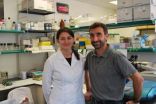(Press-News.org) A Coventry University scientist has developed a pioneering new way – using samples of beating heart tissue – to test the effect of drugs on the heart without using human or animal trials.
The breakthrough is the work of Dr Helen Maddock – an expert in cardiovascular physiology and pharmacology from the University's Centre for Applied Biological and Exercise Sciences – and could lead to the lives of hundreds of future patients being saved and the quality of their treatments improved.
Adverse effects of drugs on the cardiovascular system are a major cause of many medical treatments failing, but heart-related side-effects can often only be detected once a drug is being used on patients in clinical trials – by which time it is too late.
Dr Maddock's 'in vitro' technique – which means 'in glass' in reference to it taking place in a laboratory environment rather than in a living organism – uses a specimen of human heart tissue attached to a rig allowing the muscle to be lengthened and shortened whilst being stimulated by an electrical impulse, mimicking the biomechanical performance of cardiac muscle.
Trial drugs can then be added to the tissue to determine whether or not they have an adverse effect on the force of contraction of the muscle (and therefore of the heart), a test that could only previously be performed 'in vivo' – i.e. on living animals – often with inconclusive results.
This 'simulated' cardiovascular system – known as a work-loop assay – provides the most realistic model of heart muscle dynamics in the world to date, and opens up unprecedented possibilities for identifying negative effects of drugs early and inexpensively – potentially saving lives and speeding up the development of successful drug treatments.
Dr Maddock has formed a spin-out company – InoCardia Ltd – from Coventry University to begin implementing her groundbreaking technique in the pharma industry, and it has already received a quarter of a million pound investment from Warwickshire-based technology investment firm Mercia Fund Management.
Dr Maddock, who spent almost ten years developing the technique, said:
"I'm delighted that our research is at a stage where we can confidently say the work-loop assay we've created is the world's only clinically relevant in vitro human model of cardiac contractility. It has the potential to shave years off the development of successful drugs for a range of treatments.
"Both the pharma industry and regulators recognise that existing methods of assessing the contractility of the heart are fraught with problems, so we're incredibly excited to be able to introduce a new way to accurately determine the safety of drugs in respect of the heart without the need to test on humans or animals."
Mark Payton, managing director of Mercia Fund Management, added:
"InoCardia benefits from a proprietary approach following many years of investigation by Helen and her team, and offers the potential for early screening of compounds in development without the initial need for extensive animal trials. Through a markedly accelerated drug development process, this will decrease timelines to drug development, and as a consequence greatly reduce the cost of new drug development. The end beneficiary will, of course, be patients receiving novel treatments sooner."
Dr Maddock and InoCardia Ltd are already in discussions with a multinational biopharmaceutical company with a view to applying the assay in industry.
INFORMATION:
New technique uses 'simulated' human heart to screen drugs
2014-07-21
ELSE PRESS RELEASES FROM THIS DATE:
Age-related macular degeneration occurs much earlier than previously assumed
2014-07-21
It is widely accepted that age-related macular degeneration (AMD) is the most common cause of visual impairment and blindness in industrialized countries. However, it is questionable whether it can continue to be defined as a disease in people in their 50s and beyond. Investigations to determine the incidence of age-related macular degeneration undertaken as part of the Gutenberg Health Study of the University Medical Center of Johannes Gutenberg University Mainz (JGU) have shown that even persons under the age of 50 years may be affected by an early form of the eye disease. ...
Our daily bread
2014-07-21
Bread wheat (Triticum aestivum L.) is the most widely cultivated cereal crop in the world and provides 20 percent of the food calories consumed by humans. A polyploid species, hexaploid bread wheat contains six duplicated copies of its genome and is more than five times larger than the human genome. This makes genome research in wheat particularly difficult.
Dr. Klaus Mayer, Head of the Research Unit Plant Genome and Systems Biology at HMGU, in collaboration with his colleagues Matthias Pfeifer, Dr. Karl Kugler and Manuel Spannagl, succeeded in gaining insights into complex ...
Described novel regulator of a protein inactive in over 50 percent of human tumors
2014-07-21
Researchers at the Bellvitge Biomedical Research Institute (IDIBELL) and the University of Barcelona have discovered the interaction between HERC2 proteins with another protein called p53 that is inactivated in more than half of human tumors. The study results were published in the Journal of Biological Chemistry.
Regulation of the activity of p53 by HERC2
The team of José Luis Rosa, at the growth factors and cell differentiation research group at IDIBELL studies the molecular mechanisms of HERC family proteins. These proteins are ubiquitin ligases that regulate the ...
Potential new flu drugs target immune response, not virus
2014-07-21
The seriousness of disease often results from the strength of immune response, rather than with the virus, itself. Turning down that response, rather than attacking the virus, might be a better way to reduce that severity, says Juliet Morrison of the University of Washington, Seattle. She and her collaborators have now taken the first step in doing just that for the H7N9 influenza, and their work has already led to identification of six potential therapeutics for this highly virulent strain. The research is published ahead of print in the Journal of Virology.
"We set ...
More than glitter
2014-07-21
A special class of tiny gold particles can easily slip through cell membranes, making them good candidates to deliver drugs directly to target cells.
A new study from MIT materials scientists reveals that these nanoparticles enter cells by taking advantage of a route normally used in vesicle-vesicle fusion, a crucial process that allows signal transmission between neurons. In the July 21 issue of Nature Communications, the researchers describe in detail the mechanism by which these nanoparticles are able to fuse with a membrane.
The findings suggest possible strategies ...
Mammals metabolize some pesticides to limit their biomagnification
2014-07-21
The concentrations of many historically used, and now widely banned, pesticides and other toxic chemicals—called legacy contaminants—can become magnified in an animal that eats contaminated food; however, a new Environmental Toxicology & Chemistry study has found that Arctic mammals metabolize some currently used pesticides, preventing such 'biomagnification.'
Researchers who studied the vegetation-caribou-wolf food chain in the Bathurst region of Canada say that currently use pesticides enter the food chain and become concentrated in vegetation, but the evidence shows ...
Examining the causes of a devastating debris flow
2014-07-21
Storm-triggered landslides cause loss of life, property damage, and landscape alterations. For instance, the remnants of Hurricane Camille in 1969 caused 109 deaths in central Virginia, after 600 mm of rain fell in mountainous terrain in 6 hours. More recently, on 8 August 2010, a rainstorm-induced landslide devastated the Chinese county of Zhouqu, causing more than 1000 deaths. A new modeling study by Ren (Geophysical Research Letters) examines the multiple factors, both natural and human caused, that came together to produce this event. The triad of storm-triggered landslides ...
New research links bad diet to loss of smell
2014-07-21
TALLAHASSEE, Fla. — Could stuffing yourself full of high-fat foods cause you to lose your sense of smell?
A new study from Florida State University neuroscientists says so, and it has researchers taking a closer look at how our diets could impact a whole range of human functions that were not traditionally considered when examining the impact of obesity.
"This opens up a lot of possibilities for obesity research," said Florida State University post-doctoral researcher Nicolas Thiebaud, who led the study examining how high-fat foods impacted smell.
Thiebaud led the ...
Study provides insights into birds' migration routes
2014-07-21
By tracking hybrids between songbird species, investigators have found that migration routes are under genetic control and could be preventing interbreeding. The research, which is published in Ecology Letters, was conducted using geolocators that, like GPS, record the position of a bird and allow its long distance movement to be tracked.
Compared with their parents, hybrids exhibited increased variability in their migratory routes: some used intermediate routes across less suitable areas, while others used the same routes as one parental group on fall migration and the ...
Motoneuron-like cell transplantation and GDNF delivery for repair of SCI
2014-07-21
Adipose-derived stem cells-transdifferentiated motoneurons after transplantation can integrate in the host cord. However, cell survival has been restricted by a lack of ideal environment for nerve cell growth. Taki Tiraihi, Shefa Neuroscience Research Center at Khatam Al-Anbia Hospital, Iran developed rat models of spinal cord injury (SCI) and injected adipose-derived stem cells-transdifferentiated motoneurons into the epicenter, rostral and caudal regions of the impact site and simultaneously transplanted glial cell line-derived neurotrophic factor (GDNF)-gelfoam complex ...



